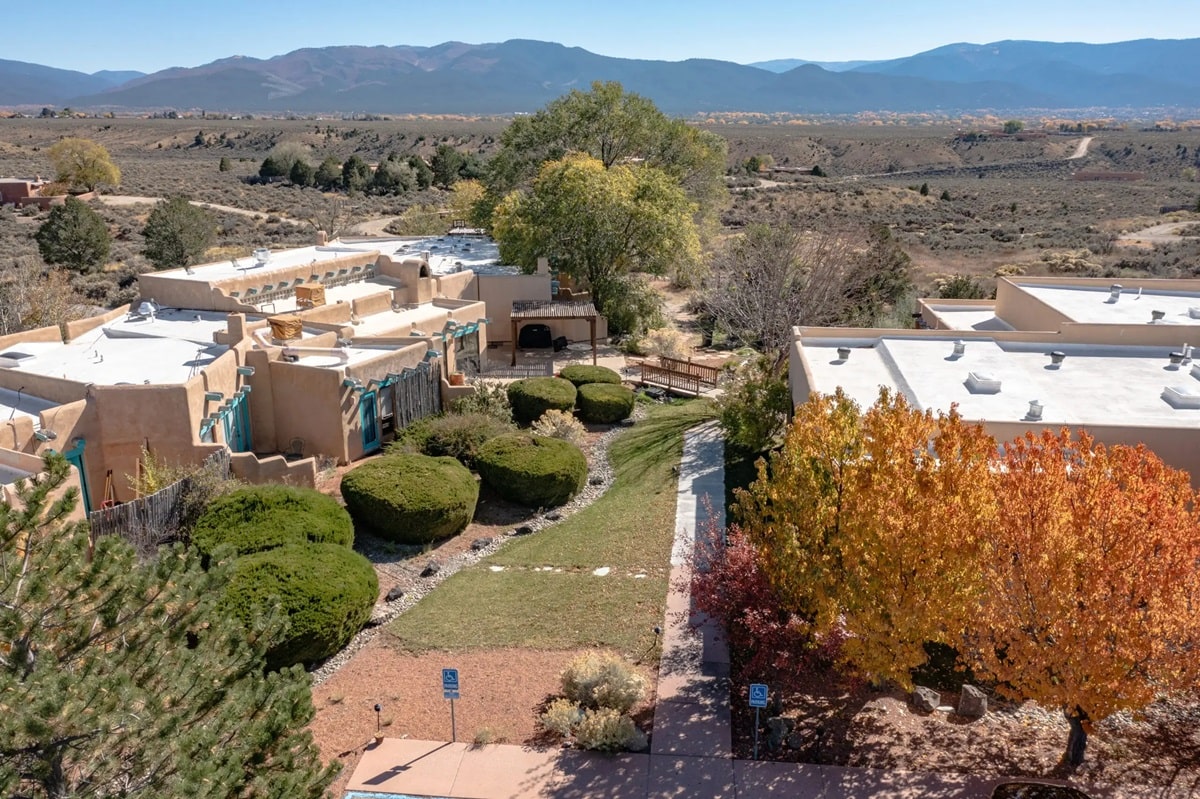Find Support at Our LGBTQ Rehab Centers at Vista Taos
Discover compassionate care at LGBTQ rehab centers, including Vista Taos. We offer tailored therapies and a supportive community for your recovery journey.
What Are LGBTQ Rehab Centers?
LGBTQ rehab centers are treatment facilities designed to provide support for members of the queer community who are struggling with substance use disorder and addiction. These centers are tailored to address the unique struggles that LGBTQ+ individuals may face.
They provide an inclusive and non-judgmental environment for recovery. Substance use disorder and addiction issues can often be worsened by:
- Societal pressures
- Discrimination
- Stigma that LGBTQ+ individuals often encounter

How Can LGBTQ+ Centers Help?
LGBTQ rehab centers work with trained professionals that understand the specific challenges and issues faced by LGBTQ+ individuals.
They often offer a variety of services, such as:
- One-on-one sessions with a therapist, which can address personal issues related to addiction and identity.
- Opportunities to connect with others who have had similar experiences, along with help to foster a sense of community and understanding.
- Involvement of family members in the treatment process to foster understanding and support.
- Approaches, like mindfulness, which can help individuals connect with themselves on a deeper level.
- Medical help for detox and other physical health needs related to substance use.
- Help in planning for life after treatment to reduce the risk of relapse.
These centers aim to create a safe space where individuals can feel accepted and understood during their recovery and healing journey.
How Do LGBTQ Rehab Centers Differ From Traditional Rehab Facilities?
LGBTQ rehab centers differ from traditional rehab facilities in their understanding and focus on the unique experiences and challenges faced by individuals in the LGBTQ+ community.
However, the core treatment components are generally the same across both types of facilities, such as:
- Detoxification
- Therapy
- Counseling
- Aftercare support
There are several distinctions with LGBTQ rehab as opposed to traditional rehab in other regards, such as:
Specialized Staff
LGBTQ rehab centers often employ staff members who are either part of the LGBTQ+ community themselves or are trained to understand and empathize with the specific issues this community faces.
This way, individuals can get the holistic and supportive care they deserve.
Tailored Therapy
Therapy at LGBTQ+ rehab centers often includes components that address issues like:
- Homophobia
- Transphobia
- Discrimination
- Stigma
- Coming out
- Identity exploration
This is often in addition to general substance use disorder therapy.
Safe and Inclusive Environment
These centers strive to create an environment where individuals feel comfortable expressing their identity freely. They often emphasize a culture of acceptance and inclusion.
Community Building
LGBTQ+ rehabs often have group therapy or activities that are LGBTQ+ specific. This can help individuals feel less isolated and build a supportive, understanding community.
Addressing Co-Occurring Disorders
Due to societal pressures and discrimination, individuals from the LGBTQ+ community have higher rates of mental health disorders. This can often co-occur with substance use disorders as well. LGBTQ+ rehab centers are equipped to diagnose and treat these co-occurring disorders.2
In contrast, traditional rehab facilities might not provide this level of specialized care for LGBTQ+ individuals. While some may be queer-friendly and promote a non-discriminatory environment, they may not have the same level of expertise or comprehensive services tailored to their unique needs.
What Challenges Do LGBTQ+ Individuals Face When Seeking Treatment?
LGBTQ+ individuals face a variety of unique challenges when seeking addiction treatment. Many of these challenges stem from societal prejudices, discrimination, and a lack of understanding or acceptance.
Stigma and Discrimination
LGBTQ+ individuals often face societal stigma and discrimination in many regards, which may be exacerbated depending on their family situation or where they live.
This may be due to their sexual orientation or gender identity. This discrimination can compound feelings of isolation and fear, which can make seeking help for addiction even more challenging.
Misunderstanding and Lack of Cultural Competence
Traditional treatment centers might not fully understand the unique challenges faced by LGBTQ+ individuals. This could lead to suboptimal care or individuals not feeling adequately supported.
Coming Out
The process of coming out can be a significant source of stress and anxiety for some individuals.
Minority Stress
This refers to the chronic stress faced by individuals in stigmatized minorities. This can contribute to substance use and mental health disorders.
How Rehab Centers Create a Safe Space for LGBTQ+ Individuals
LGBTQ rehab centers make efforts to create a safe and inclusive environment for those within the LGBTQ+ community. These rehabs adopt a variety of strategies, including:
Culturally Competent Staff
Staff members at these rehabs are either part of the community or trained to understand the challenges faced by this community.
Respect for Identity
LGBTQ rehab centers will respect each individual’s:
- Chosen name
- Pronouns
- Gender identity
These programs also strive to create a safe space. This space allows individuals to feel comfortable expressing their sexual orientation without fear of stigma.
Non-Discriminatory Policies
LGBTQ rehab centers have strict non-discrimination policies. These ensure that all individuals are treated with respect and dignity.
Education and Awareness
These centers often run educational programs aimed at promoting understanding and acceptance among all clients. This helps to foster a community of mutual respect and understanding.
Support Groups
There are support groups tailored to LGBTQ+ individuals. These can provide a space where individuals can share their experiences with peers who understand.
Inclusive Facility Design
Some facilities may also incorporate inclusive designs to create a more accepting environment. This might include gender-neutral bathrooms or other accommodation options.
Privacy and Confidentiality
These centers uphold strict privacy and confidentiality policies. This is to protect the identities and personal information of their clients.
By employing these strategies, LGBTQ rehab centers can address the challenges faced by this community. These practices help to enhance the recovery process for LGBTQ+ individuals.
Specialized Therapies Offered at LGBTQ Rehab Centers
LGBTQ rehab centers offer a range of specialized therapies to support the unique needs of LGBTQ+ individuals. These therapies aim at addressing the challenges faced by the LGBTQ+ community.
Some of these specialized therapies include:
Affirmative Therapy
Affirmative therapy is an approach that validates the identities and experiences of LGBTQ+ individuals. It addresses negative societal influences, such as discrimination and homophobia.3 This approach helps individuals cope with stressors and improve self-acceptance.
Cognitive-Behavioral Therapy (CBT)
Group Therapy
LGBTQ+-specific group therapy sessions provide a supportive environment. This environment allows individuals to share their experiences with others who can relate to their journey.
Family Therapy
This is often an essential component of treatment at LGBTQ rehab centers. It helps to foster understanding and acceptance within the family.
Therapists work with families to address issues like discrimination, stigma, and the process of coming out.
HIV/AIDS Counseling
Some LGBTQ+ individuals may be dealing with HIV/AIDS-related concerns. LGBTQ rehab centers often provide counseling and education about these issues.
Trauma-Informed Care
Substance Use Education
LGBTQ+-specific substance use education may focus on substances that are prevalent within the community and address unique risk factors for substance use.
Aftercare and Alumni Programs
These programs provide ongoing support and resources for individuals after they leave the treatment center. This might include connections to LGBTQ+-friendly support services and resources in the community.
Through these specialized therapies and programs, LGBTQ rehab centers strive to offer comprehensive care that meets the unique needs of every patient.
Benefits of Attending LGBTQ Rehab Centers
There are several potential benefits to attending an LGBTQ+ rehab center as opposed to a non-specialized rehab facility if you feel like specialized care may benefit you, including:
- Care and support that is competent to your needs
- A safe and inclusive environment, free from discrimination
- Being around peers who understand and can relate to your experiences, which can reduce feelings of isolation.
- Approaches that address both substance use disorder issues and any related mental health concerns.
While these potential benefits exist, it’s important to note that the best choice of treatment center depends on your personal needs and preferences.
How LGBTQ Rehab Centers Address The Diversity of Identity
Intersectionality recognizes that individuals have many overlapping identities.6 These identities can affect individuals’ experiences and the discrimination they may face.
LGBTQ rehab centers strive to understand and address these many identities. This helps to provide comprehensive care. Here are some ways these rehabs might do this:
- Treatment plans created to address the individual experiences and identities of each person
- Providing education and awareness programs to help all clients and staff understand and respect the diverse identities and experiences of others.
- Many centers partner with community organizations that serve various groups within the LGBTQ+ community. These partnerships can help centers connect clients with extra resources and support.
- Some centers may offer ways to make treatment more accessible to those from all backgrounds. This might include sliding scale fees, scholarships, and help with insurance.
What to Know About Intersectionality
By acknowledging and addressing intersectionality, LGBTQ+ rehab centers can offer a more comprehensive approach to care.
This not only helps individuals feel seen and understood, but also allows centers to better address the challenges that each individual faces in their journey to recovery.
Maintaining Recovery After Completing LGBTQ Rehab
Maintaining long-term recovery from substance use disorders often requires ongoing support and resources. LGBTQ+ rehab centers often provide aftercare plans. These can include a variety of resources suited to meet the needs of the LGBTQ+ community.
Some of these resources might include:
Continuing Therapy
Ongoing individual or group therapy can provide continued emotional support and help manage stressors that may cause relapse.
Alumni Programs
Many rehab centers have alumni programs. This is where former clients can support each other and share their experiences of recovery.
Community Support Groups
Connection with community support groups such as LGBTQ+-friendly Alcoholics Anonymous (AA) or Narcotics Anonymous (NA) meetings can provide continued peer support.
LGBTQ+ Community Centers
These centers often offer a range of support services, including:
- Support groups
- Counseling
- Social events
They can also connect individuals with other resources in their local community.
Sober Living Homes
Sober living homes provide a structured, drug-free environment for those in recovery. Some homes are designed for the LGBTQ+ community specifically.
Healthcare Providers
Regular check-ins with healthcare providers who are LGBTQ+-friendly can help manage physical and mental health, along with any ongoing medication needs.
Job and Housing Help
Some programs provide job and housing help. This helps to support individuals in maintaining a stable and healthy lifestyle after treatment.
Online Resources
Online resources are a great way to maintain recovery by:
- Receiving continued support
- Creating a sense of community
- Being available for advice
By connecting with these resources and maintaining a strong support system, LGBTQ+ individuals can build a healthier, substance-free future.

Find Supportive and Holistic Help With Vista Taos
At Vista Taos, we understand the unique needs and challenges faced by the LGBTQ+ community in their journey towards recovery. We aim to provide inclusive and restorative treatment for individuals from all walks of life.
Our dedicated team of professionals is committed to providing culturally sensitive and compassionate care in a safe, accepting environment.
What Do We Offer?
We offer a range of specialized therapies and programs tailored to address the specific experiences of the LGBTQ+ community. We understand that each individual’s experiences are unique and shaped by their identities.
With our aftercare programs and resources, we strive to support you beyond your time at our facility. We offer ongoing help to ensure your long-term recovery and well-being. Vista Taos is here to stand with you and support you in your journey towards recovery.
Find the support and treatment you deserve with Vista Taos. Contact us today for patient-centered care and support every step of the way.
Resources
- https://nida.nih.gov/research-topics/substance-use-suds-in-lgbtq-populations
- https://www.psychiatry.org/psychiatrists/diversity/education/lgbtq-patients
- https://pubmed.ncbi.nlm.nih.gov/28561257/
- https://www.apa.org/ptsd-guideline/patients-and-families/cognitive-behavioral
- https://www.traumainformedcare.chcs.org/what-is-trauma-informed-care/
- https://www.intersectionaljustice.org/what-is-intersectionality




